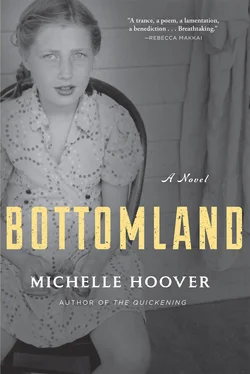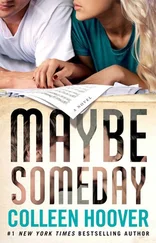It was more than twenty years before the letter arrived. Since the day I left, I had every month or two written my parents. I gained no reply. I imagined my mother and father sitting in their kitchen. They stared at my words under a dim kerosene lamp. Were she alone, my mother might push her plate aside and search for a piece of paper to write. But my father would surely hold her arm.
Selfishness , I had often heard him say. I am not rewarding it .
Those were the years I walked our land morning and night. Our crops transformed from seed to harvest. Seed again. Farther off, farmers brought their wagons to stake the land. At home my wife birthed four daughters and two sons. The years were months. The marks of a pencil on the wall. One girl replaced another in the same hand-me-down dress. With every child, I feared for Margrit’s health. I swore I never would touch her again. It was the kind of thing that turned sleeping with a wife, as God saw fit, a terrible bloody business.
“We are from this place,” Margrit told the children. “We are from nowhere else.”
But then our youngest, Myrle. “We should not think to have another,” Margrit said. I held the girl to my shoulder, her breath on my neck. The child was so slight, so strange. Her every cry moved me to distraction. How desperately I worked to spare her pain. Must a man reach his last before his children become more to him than their endless demands?
“Father, you have a letter,” my eldest said.
It was a sweltering day in autumn. Nan stood at the stove, stirring a pot of soup. At the table Myrle clutched at her doll of buttons and rags. The other girls kicked their feet in their chairs, a pile of corn husks between them. The kitchen was in a state. The room was thick with steam, the sting of onions. The ceiling above the stove had gone black, the planks below caving beneath its stout iron weight. Our tabletops never were enough to feed so many at once. Still we were to host our neighbors for a picnic, as Margrit insisted. Their farms had quickly appeared on the horizon. Their children ran our fields as if ignorant of fences. I knew the men that owned these farms mostly by sight. An exchange of words about seeds or weather. That seemed enough. Now Margrit needed tablecloths, napkins.
“Why such a fuss?”
She squeezed my chin between finger and thumb. “I will wash them after for us to have curtains. Then you can close them all you want.”
Nan stopped her spoon and drew the letter from her pocket. The blue envelope was mottled with stamps. “It’s from Europe, I think. The postmark says Hamburg.”
“Germany?” asked Margrit.
I turned the letter over. “My mother.” Though I was not so certain. The writing on the envelope was strange, as if my mother had stooped beneath a candle with her pen.
Margrit sighed. “After so much time?”
I shook my head. The bread was rising in the oven, the soup simmering. A large sour roast and spätzle crowded the stove. The house seemed to breathe with every boiling pot. Our Esther gave up helping and raced screaming in a pair of trousers down the hall. “I asked her to wear her green dress,” explained Nan. “You’d think I’d cut off her head.” Myrle let out a wail, her doll fallen to the floor. Agnes gathered the husks close so they might not be swept away from her. Soon the kitchen spun with one girl after another. I stood unmoving in fear of collision, the letter pressed to my stomach as if it had somehow unmade us. Of that land I had left, I could not think. Could not so much as remember its smell. Calm now under the arm of her mother, Myrle whimpered. Her hair clung to her cheeks in pale strands. I slipped the letter in my pocket and rested a hand on her crown, soft as silk as her hair was.
“Go on now, Nan, take a rest,” said Margrit. “But first convince Esther to wear something decent.”
Nan swept her apron over her head and hurried out.
“And you, Julius,” said Margrit. “Make yourself some use and see to the tables. I asked Ray to set them, but he wasn’t too happy about it.”
Outside, two tables waited in the shade of our yard, the new tablecloths fastened with pins. Ray had finished what his mother asked. Now he stood with Lee in the barn to see to the broken thresher. At the gate, Elliot and his wife hurried down the path with their son. Elliot dropped a platter on the table, and Mary scattered a handful of flowers. Their boy bounded off to the barn to join my own. In the distance, Mrs. Clark and her brood marched along the grassy lane. Like rabid animals, her trio of girls raced through the weeds. A house full of women. What it might make of a man. Mr. Clark could only but stumble along behind them, thin as a rake.
“Awfully nice,” Mary let out. She fluffed her skirt, stretched a pale leg over the bench. Elliot watched her until she settled. She took a fair amount of time. “Awfully nice,” she said again. She jarred her husband with an elbow. His sour expression remained.
“Look what those boys are doing,” she said. Our sons had carried the topmost sieve into the yard. Now they sat together in the grass with the contraption between them. “Regular old fixer-uppers.”
I nodded. “I have given the thresher over to them.”
“Just the two of them and so many girls,” said Mary.
“Thank God for those.”
“You know what I heard at the market the other day? This will be the warmest year on record, that’s what Mrs. Conners says.”
“Has she?”
“The Conners, they seem to know everything. Terrible things. What with that fuss in Europe. I never would have given much thought to the Germans, but Linda says they’re fighting for what rightfully isn’t theirs. Everyone’s for the Kaiser, she says. The Germans sure like their hops. That’s all I could answer her. As far as I’m concerned, I hope Wilson holds to his senses and keeps us out of it.”
I opened my hands on our table. We are from nowhere else , Margrit had said. Behind us in the kitchen, my wife called out instructions to the girls. Elliot eyed me under the brim of his hat.
“Our pastor says the Irish will never let us join the war,” said Mary. She lifted the hat from her husband’s head, clicked her tongue. “But Pastor Michaels is a pacifist. My grandmother was a Brit, Irish or not. That’s our side of it anyway.”
The hat lay on the table between us. Elliot coughed into his fist. “You don’t. ” Her eyes widened. “Do you still have family over there?”
“No.” I winced. “Margrit and I left years ago.”
“And you’re no drunkards,” said Mary. “You’re not marching about. You keep up your fences.”
“We try.”
Mary reddened, her breathing fast. “Oh you’re so much better than that!”
Elliot coughed again. “What do you hear of prices?”
“Well.” Mary pressed a hand to her cheek. “That’s my signal. I’d be a better help in the kitchen. Besides, Margrit’ll want to hear about the Parsons.” She bowed her head in a whisper. “That girl of theirs. With a child! Might well drive them out of town. That’s what Mrs. Conners says.” She stood and glanced back, fetched one of her flowers from the table to carry inside.
Elliot watched her go.
“Prices are two to one,” I offered him.
“That all?”
“If a man could raise more stock, it would be something. That land of ours on the river, a plow or reaper can never run near it. But I have heard of some who are straightening their waterways.”
Elliot squinted at me.
“To recover the land. A straighter channel, less flooding.”
“Recover it,” he said. “I don’t have the hands to work what I have now.”
“It could save us from falling behind the others.”
Читать дальше












